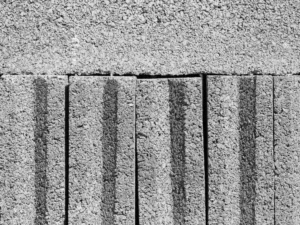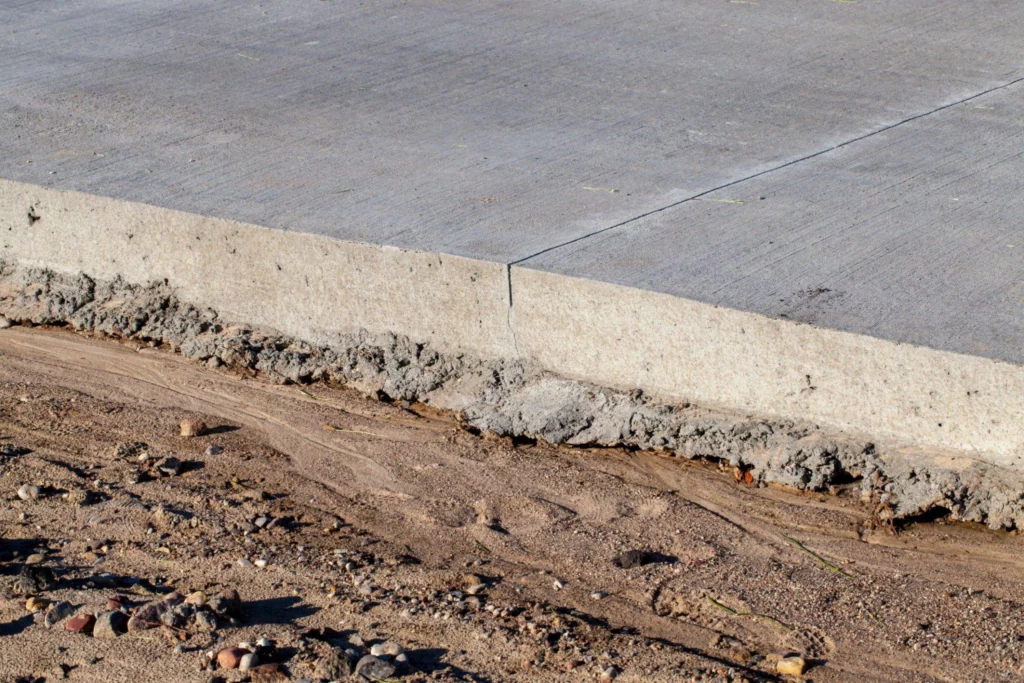Have you ever wondered, “How thick should concrete be?” You’re not alone. Here at Cronus Concrete, we often receive this question from both novice and seasoned builders. The truth is the thickness of your concrete depends on various factors, including the purpose of the slab, the Weight it needs to support, and the type of soil it will be laid on. Here’s what you need to know: 
- The Purpose of the Slab: If you’re laying a simple walkway, your concrete must only be 4 inches thick. However, if you’re building a driveway or garage floor that will need to support heavy vehicles, your concrete may need to be up to 6 inches thick.
- The Weight it Needs to Support: Not surprisingly, the more Weight your concrete needs to support, the thicker it should be. A good rule of thumb is to add an extra inch of thickness for every 10 tons of Weight the slab will need to support.
- The Type of Soil: The soil type also plays a critical role in determining the thickness of your concrete. For instance, looser, more sandy soils may require a thicker slab to ensure stability, while denser, clay-based grounds can get by with a thinner slab.
So, let’s dive deeper into the factors determining your concrete’s thickness and how you can calculate the right consistency for your specific project.
Industry Standards for Concrete Thickness
When determining how thick your concrete should be, it’s essential to consider the industry standards. These guidelines ensure the durability and longevity of your concrete project. At Cronus Concrete, we understand the importance of getting it right. 
- Residential Driveways: A thickness of 4 inches is recommended for most driveways. This is generally adequate to support the Weight of most vehicles without cracking or breaking. However, if the driveway is frequently used by larger vehicles such as trucks or RVs, consider a thickness of 5 to 6 inches.
- Garage Floors: Garage floors typically require a thicker layer of concrete due to the heavy loads they can experience. A thickness of 4 to 5 inches is usually sufficient. If you plan on using the garage for heavy machinery, a thickness of 6 inches is advisable.
- Patios, Walkways, and Other Outdoor Spaces: For most patios, walkways, and other outdoor spaces, a thickness of 4 inches is recommended. A thicker layer may be required if these spaces will be used for heavy outdoor furniture or feature structures such as outdoor fireplaces.
Factors that Affect Concrete Thickness
When planning a concrete project, it’s essential to understand that the thickness of concrete plays a critical role in its strength and durability. The thickness of the concrete you need can vary depending on various factors. Let’s delve into these factors that can affect the consistency of concrete.
- Load-Bearing Capacity : The type and load the concrete will bear significantly impacts its required thickness. For instance, a driveway that needs to support the Weight of heavy vehicles will require a thicker layer of concrete than a simple walkway in your backyard.

- Ground or Soil Condition : Another critical factor is the condition of the soil or ground where the concrete will be laid. If the ground is soft and prone to shifting, you may need a thicker layer of concrete to maintain stability and prevent cracking.
Type of Project
The nature of your project also determines the thickness of the concrete. For instance, residential projects often require thinner layers than commercial projects due to usage and weight load differences.
- Weather Conditions : Lastly, it would be best if you considered the local weather conditions. Extreme temperatures, frequent rainfall, and freeze-thaw cycles can all play a role in determining the ideal thickness of concrete for your project.
To summarise, there is no one-size-fits-all answer to how thick concrete should be. It depends on the load-bearing capacity, ground conditions, type of project, and local weather conditions. At Cronus Concrete, we can provide expert guidance to help ensure your project’s success. Don’t hesitate to reach out to us for all your concrete-related queries.
Understanding the Importance of Concrete Thickness
Concrete is the backbone of any construction project. Its robustness and durability make it an excellent choice for various applications. But have you ever wondered how thick your concrete should be? At Cronus Concrete, understanding the importance of concrete thickness or slip sheet is crucial for the success of your project and for weight of concrete. Let’s dive deeper into this topic.
Factors Determining Concrete Thickness
The thickness of concrete depends on several factors. The primary ones include:
- Load-Bearing Capacity: This is the most critical factor. Concrete used in areas with heavy traffic or load, such as driveways, must be thicker.
- Ground Condition: The underlying soil or ground condition also influences the thickness. Areas with weak or unstable soils require a thicker concrete layer.
- Type of Project: The type of construction project also plays a role. For instance, a house slab might require a different thickness than a commercial building floor.
Recommended Concrete Thickness
There is no one-size-fits-all answer when it comes to the ideal concrete thickness. However, we can provide some general recommendations based on our experience at Cronus Concrete.
Choosing the Right Concrete Thickness for Your Project
When it comes to concrete projects, one of the most critical decisions you’ll make is determining the appropriate thickness of the concrete. This decision can significantly impact the durability and longevity of your project. Here at Cronus Concrete, we’re dedicated to helping you make informed decisions about your concrete needs.
Factors Influencing Concrete Thickness
Several factors can influence the thickness of the concrete you’ll need for your project. Let’s take a closer look at them:
- Load-Bearing Capacity: The concrete should be thicker if it is expected to bear heavy loads. For instance, driveways or garage floors typically need thicker concrete than walkways or patios.
- Subgrade Stability: The stability of the underlying soil can also impact the thickness required. The less stable the subgrade, the thicker the concrete layer needs to be.
- Climate: Weather conditions and the environment can affect the concrete’s thickness. In colder climates with frequent freeze-thaw cycles, thicker concrete is often required.
General Guidelines for Concrete Thickness
While the specific requirements for concrete thickness can vary, some general guidelines can serve as a starting point:
- Driveways: The concrete should be at least 4 inches thick for residential driveways.
- Garage Floors: Concrete garage floors should be at least 4 inches thick, but 5 inches is often recommended for improved durability.
- Sidewalks and Walkways: A thickness of 4 inches is usually sufficient for these areas.
- Patios: For patios, 4 inches is typically the standard thickness.
Getting Professional Advice
When in doubt, seeking professional advice’s always a good idea. The team at Cronus Concrete is always ready to assist you in determining the right thickness for your concrete project. With our knowledge and expertise, you can feel confident that you’re making the right decisions for your project.
Concrete Thickness for Different Types of Applications
Concrete, being its versatile material, has a myriad of applications. From walkways and patios to driveways and foundations, the usage of concrete is extensive. However, the key to leveraging its strength is understanding the appropriate thickness required for different applications. Here at Cronus Concrete, we’ve got you covered with guidelines.
- Walkways and Patios : For areas like walkways and patios that experience light foot traffic, a thickness of 4 inches is usually sufficient. This thickness provides a good balance between strength and cost-effectiveness. It’s also easy to work with, making it popular for DIY projects.
- Driveways : If you’re dealing with driveways that need to support heavier vehicles like SUVs and trucks, you’ll need to up the ante a bit. A thickness of 5 to 6 inches is recommended in this case. Consequently, this ensures a robust, long-lasting driveway that can withstand heavy loads.
- Garages and Foundations : For garages and foundations that bear considerable Weight and need to stand the test of time, a thickness of 6 to 8 inches is ideal. This thickness is significant for foundations, as they are critical to the structural integrity of the entire building.
- Commercial Applications : In commercial applications that experience high traffic and heavy loads, the thickness of the concrete layer may need to be between 8 to 12 inches. Therefore, this ensures that the concrete can withstand heavy use without cracking or breaking down prematurely.
To summarize, the thickness of your concrete layer will depend on its application, the expected load it will bear, and the specific conditions of your site. Remember, when in doubt, it’s always best to consult with the experts at Cronus Concrete to get the best advice for your project.
Calculating the Required Thickness of Concrete
So, you’ve decided on using concrete for your project, but you’re still determining how thick your concrete should be. You’re in the right place! At Cronus Concrete, we’re here to help you figure this out. Let’s dive in.
General Guidelines for Concrete Thickness
While the thickness of your concrete will depend on these factors, here are some general guidelines to help you get started:
ProjectSuggested Concrete Thickness
Walkways 4 inches
Driveways 6-8 inches
Garage Slabs 4-6 inches
Patio 4-6 inches
How to Calculate Concrete Thickness
Now, let’s talk about how you can calculate the thickness of your concrete. Here’s a simple step-by-step guide:
- Determine the load your concrete will need to bear. This includes static load (like the Weight of a parked car) and dynamic load (like the Weight of a vehicle moving over a driveway).
- Assess the soil condition of your site. If the ground is unstable, consider consulting a professional for advice.
- Consider the weather conditions in your area. You may need thicker concrete if you live in a region with harsh winters or heavy rainfall.
- Finally, once you have all this information, you can calculate the required thickness. Don’t hesitate to contact us at Cronus Concrete if you need any assistance!
Remember, the thickness of your concrete is crucial for its durability and performance. So, take your time with this step, consult professionals if needed, and ensure you get it right. We’re always here to help at Cronus Concrete!
Maintaining the Quality of Concrete Thickness
At Cronus Concrete, we understand how important maintaining the quality of your concrete thickness is. Your concrete’s thickness can significantly affect its durability and longevity. Ensuring it is maintained correctly is crucial to maximizing your investment and achieving the best possible outcome.
It’s essential to consider a few key factors when maintaining concrete thickness:
- Purpose of the Concrete Structure :
 The first thing to consider is the intended use of your concrete structure. The thickness of the concrete should be proportionate to the load it is expected to carry. For instance, a driveway that supports heavy vehicles will require thicker concrete than a simple garden pathway.
The first thing to consider is the intended use of your concrete structure. The thickness of the concrete should be proportionate to the load it is expected to carry. For instance, a driveway that supports heavy vehicles will require thicker concrete than a simple garden pathway. - Soil Conditions : Understanding the soil conditions of your site is crucial. If the ground is soft and unstable, a thicker layer of concrete may be required to ensure stability. Conversely, a thinner layer may suffice if the soil is hard and stable.
- Weather Conditions : Weather can significantly affect the durability of your concrete. In places with harsh winters, concrete should be thicker to withstand freezing and thawing cycles. On the other hand, in regions with mild climates, a thinner layer of concrete may be adequate.
General Guidelines for Concrete Thickness
As a general rule of thumb, here at Cronus Concrete, we recommend the following concrete thicknesses for different applications:
- Driveways: 4-5 inches
- Pedestrian walkways: 3-4 inches
- Garage floors: 4-5 inches
- Patio and pool decks: 4-5 inches
Remember, these are only guidelines. The specific thickness needed may vary based on the factors we’ve discussed above. It’s always best to consult a professional before making a final decision.
Choosing the right concrete thickness is critical for the structure’s longevity and performance. Consider all the factors and seek professional guidance to get it right. Here at Cronus Concrete, we’re always ready to help you make informed decisions about your concrete needs.
Frequently Asked Questions
Q1: How thick should concrete be for different applications?
Ans: The thickness of concrete varies based on the application. For walkways and patios, 4 inches is often sufficient. Driveways may require 6 to 8 inches, while garage floors typically need 4 to 6 inches. Commercial applications might need 8 to 12 inches for high traffic and heavy loads.
Q2: How does load-bearing capacity affect concrete thickness?
Ans: Load-bearing capacity plays a crucial role in determining concrete thickness. Areas with heavy traffic or vehicles, like driveways, need thicker concrete to withstand the weight and prevent cracking.
Q3: Can soil conditions impact concrete thickness?
Ans: Yes, soil conditions matter. Unstable or soft soils may require thicker concrete for stability, while stable soils might allow for a thinner layer.
Q4: What’s the role of weather conditions in concrete thickness?
Ans: Weather conditions matter, especially in regions with freezing temperatures. Harsh weather can cause concrete to crack, so thicker concrete is needed to withstand freeze-thaw cycles.
Q5: Are there general guidelines for residential concrete thickness?
Ans: Yes, for residential projects: driveways should be 4-5 inches, walkways 3-4 inches, garage floors 4-5 inches, and patios 4-5 inches thick. These are starting points and should be adjusted based on specific factors.
